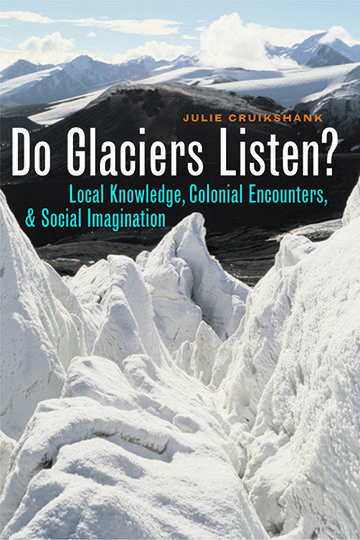About BC Books Online
BC Books Online was created for anyone interested in BC-published books, and with librarians especially in mind. We'd like to make it easy for library staff to learn about books from BC publishers - both new releases and backlist titles - so you can inform your patrons and keep your collections up to date.
Our site features print books and ebooks - both new releases and backlist titles - all of which are available to order through regular trade channels. Browse our subject categories to find books of interest or create and export lists by category to cross-reference with your library's current collection.
A quick tip: When reviewing the "Browse by Category" listings, please note that these are based on standardized BISAC Subject Codes supplied by the books' publishers. You will find additional selections, grouped by theme or region, in our "BC Reading Lists."
Do Glaciers Listen? explores the conflicting depictions of glaciers to show how natural and cultural histories are objectively entangled in the Mount Saint Elias ranges. This rugged area, where Alaska, British Columbia, and the Yukon Territory now meet, underwent significant geophysical change in the late eighteenth and nineteenth centuries, which coincided with dramatic social upheaval resulting from European exploration and increased travel and trade among Aboriginal peoples. European visitors brought with them varying conceptions of nature as sublime, as spiritual, or as a resource for human progress. They saw glaciers as inanimate, subject to empirical investigation and measurement. Aboriginal oral histories, conversely, described glaciers as sentient, animate, and quick to respond to human behaviour. In each case, however, the experiences and ideas surrounding glaciers were incorporated into interpretations of social relations. Focusing on these contrasting views during the late stages of the Little Ice Age (1550-1900), Cruikshank demonstrates how local knowledge is produced, rather than discovered, through colonial encounters, and how it often conjoins social and biophysical processes. She then traces how the divergent views weave through contemporary debates about cultural meanings as well as current discussions about protected areas, parks, and the new World Heritage site. Readers interested in anthropology and Native and northern studies will find this a fascinating read and a rich addition to circumpolar literature.
Julie Cruikshank is professor emerita in the Department of Anthropology and Sociology at the University of British Columbia. She is the author of Life Lived Like a Story (winner of the 1992 MacDonald Prize); Reading Voices; and The Social Life of Stories. In 2012 she was awarded a Clio Lifetime Achievement Award for The North by the Canadian Historical Association
- Winner, Clio Award (North), Canadian Historical Association
- Winner, Julian Steward Award, American Anthropology Association
- Winner, K.D. Srivastava Award, UBC Press
- Winner, Vic Turner Prize in Ethnographic Writing, Society for Humanistic Anthropology
Perhaps the crucial word in the title is “Listen.” The reader must listen carefully to the words as spoken by others in this beautifully crafted book. Do Glaciers Listen? is a fascinating read. Cruikshank’s discussion of how encounters shape and create perceptions of the world, and how layers of meaning are forced onto landscapes by peoples is thoroughly thought provoking. This book is highly recommended for scientitst, anthropologists, historians, and everyone with an interest in the social construction of landscapes.
Cruikshank’s book is sophisticated, rigorous, and exciting. Its pages brim with nuanced takes on epistemology, sensitive descriptions of ice, and rigorous analyses of cultural interactions. This is indeed a tour de force in interdisciplinary studies.



